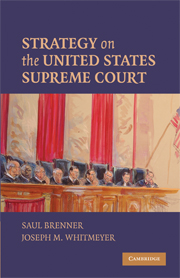Book contents
- Frontmatter
- Contents
- Preface
- PART I INTRODUCTION
- PART II CERTIORARI
- PART III THE CONFERENCE VOTE ON THE MERITS
- PART IV THE MAJORITY OPINION AND OTHER OPINIONS
- 8 The Extent of Successful Bargaining over the Content of the Majority Opinion
- 9 The Size of Opinion Coalitions
- 10 At Whose Ideal Point Will the Majority Opinion Be Written?
- 11 Reciprocity on the Supreme Court
- PART V THE FINAL VOTE ON THE MERITS
- PART VI CONCLUDING CHAPTERS
- Appendix 1 Decision Making on the United States Supreme Court
- Appendix 2 Additional Questions to Explore
- References
- Table of Cases
- Index
8 - The Extent of Successful Bargaining over the Content of the Majority Opinion
Published online by Cambridge University Press: 05 June 2012
- Frontmatter
- Contents
- Preface
- PART I INTRODUCTION
- PART II CERTIORARI
- PART III THE CONFERENCE VOTE ON THE MERITS
- PART IV THE MAJORITY OPINION AND OTHER OPINIONS
- 8 The Extent of Successful Bargaining over the Content of the Majority Opinion
- 9 The Size of Opinion Coalitions
- 10 At Whose Ideal Point Will the Majority Opinion Be Written?
- 11 Reciprocity on the Supreme Court
- PART V THE FINAL VOTE ON THE MERITS
- PART VI CONCLUDING CHAPTERS
- Appendix 1 Decision Making on the United States Supreme Court
- Appendix 2 Additional Questions to Explore
- References
- Table of Cases
- Index
Summary
To what extent does the majority opinion writer alter his initial majority opinion to obtain the votes of the other justices? Baum (1997, p. 106) tells us that “it is standard practice [for the justices] to modify the language of opinions in an effort to win colleagues' support,” and Maltzman, Spriggs, and Wahlbeck (1999, p. 55) inform us that
Murphy (1964), Spriggs, Maltzman, and Wahlbeck (… [1999]), Epstein and Knight (1998) and others argue that justices regularly make suggestions and threats and even circulate separate opinions as a mechanism for extracting concessions from the majority opinion author. And, they show that majority opinion authors frequently respond to these bargaining strategies by altering the opinion. (Emphasis supplied by us)
We evaluate these statements in this chapter by examining the data supplied by Maltzman, Spriggs, and Wahlbeck (2000).
Maltzman, Spriggs, and Wahlbeck (2000) investigated opinion coalition formation on the Burger Court and discovered that the justices who dissented at the conference vote on the merits rarely sought any changes in the majority opinion, but when they did, their suggestions were almost always ignored by the majority opinion writer. Thus, if these justices shifted to the majority and joined the majority opinion, they almost always did so without getting the majority opinion writer to change his initial opinion. If any bargaining took place on this Court, it is much more likely to have taken place between the majority opinion writer and the members of the conference coalition.
- Type
- Chapter
- Information
- Strategy on the United States Supreme Court , pp. 71 - 80Publisher: Cambridge University PressPrint publication year: 2009



